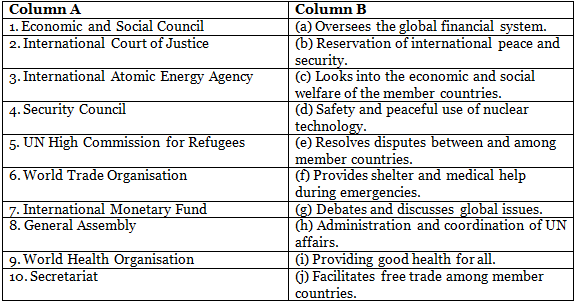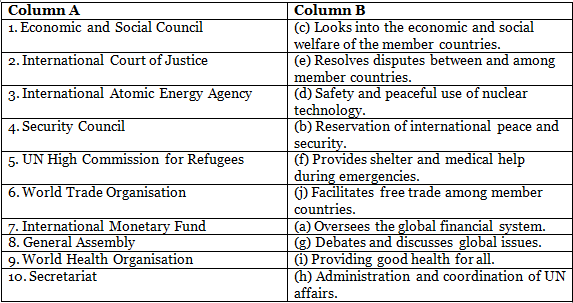NCERT Solutions for Class 12 Political Science - International Organisations
Q1: Mark correct or wrong against each of the following statements about the veto power:
(a) Only the permanent members of the Security Council possess the veto power.
(b) It’s a kind of negative power.
(c) The Secretary General uses this power when not satisfied with any decision.
(d) One veto can stall a Security Council resolution.
Ans:
(a) Correct
(b) Correct
(c) Wrong
(d) Correct
Q2: Mark correct or wrong against each of the following statements about the way the UN functions:
(a) All security and peace related issues are dealt within the Security Council.
(b) Humanitarian policies are implemented by the main organs and specialised agencies spread across the globe.
(c) Having consensus among five permanent members on security issues is vital for its implementation.
(d) The members of the General Assembly are automatically the members of all other principal organs and specialised agencies of the UN.
Ans:
(a) Correct
(b) Wrong
(c) Correct
(d) Wrong
Q3: Which among the following would give more weightage to India’s proposal for permanent membership in the Security Council?
(a) Nuclear capability
(b) It has been a member of the UN since its inception.
(c) It is located in Asia.
(d) India’s growing economic power and stable political system.
Ans: (d) India’s growing economic power and stable political system.
Q4: The UN agency concerned with the safety and peaceful use of nuclear technology is:
(a) The UN Committee on Disarmament
(b) International Atomic Energy Agency
(c) UN International Safeguard Committee
(d) None of the above.
Ans: (b) International Atomic Energy Agency
Q5: WTO is serving as the successor to which of the following organisations:
(a) General Agreement on Trade and Tariffs
(b) General Arrangement on Trade and Tariffs
(c) World Health Organisation
(d) UN Development Programme
Ans: (a) General Agreement on Trade and Tariff
Q6: Fill in the blanks:
(a) The prime objective of UN is _________
(b) The highest functionary of the UN is called ________
(c) The UN Security Council has ______________ permanent and _________ non permanent members.
(d) ______________ is the present UN Secretary General.
Ans:
(a) to maintain peace and security
(b) Secretary General
(c) 5, 10
(d) Antonio Guterres
Q7: Match the principal organs and agencies of the UN with their functions:
 Ans:
Ans: 
Q8: What are the functions of Security Council?
Ans: Its main function is to maintain peace and security in the world and the other functions are as follows:
- The Security Council recommends methods to adjust disputes among nations.
- Security Council can take military action if required.
- Security Council elects the judges of International Court of Justice and appoints the Secretary General by recommending to the General Assembly.
- Security Council can apply economic sanction also to stop any aggression.
- The Security Council can investigate the disputes in case a friction arises.
Q9: As a citizen of India, how would you support India’s candidature for the permanent membership of Security Council? Justify your proposal.
Ans: As a citizen of India, we may support India’s candidature for the permanent membership of Security Council in the following manner:
- India is the most populous country in the world with one-fifth of world population.
- India is world’s largest democracy.
- India’s economic emergence on the World Stage.
- India is a regular financial contributor to the UN.
- India signifies a growing importance in world affairs in conduct of its foreign policy.
- India participated in all the initiatives of the UN.
Q10: Critically evaluate the difficulties involved in implementing the suggested reforms to reconstruct the UN.
Ans: The following are the question marks in implementing the suggested reforms to reconstruct the UN:
- How big an economic and military power may qualify to become UNSC membership?
- What level of budget contribution should be enabled?
- No guarantee to be effective as Council Member in respect for democracy and human rights.
- Why should the issue of equitable representation decided by geography? Why not by levels of economic development?
- Why not to give more seats to members of developing world?
All the above mentioned criteria which were adopted bud not universally accepted. Hence, the difficulties were involved.
Q11: Though the UN has failed in preventing wars and related miseries, nations prefer its continuation. What makes the UN an indispensable organisation?
Ans:
- Interdependence and globalisation is not possible without the international organisations such as the UN.
- To enforce cooperation on the issues of poverty, unemployment, environmental degradation, crime rate etc.
- To provide financial assistance to developing countries to stabilise economy all over the world,, the UN and its specialised agencies are always required.
- The UN works as a forum to solve any international dispute among nations and sort out the best possible way.
- Hence, though the UN has failed in preventing related wars and miseries, despite the nations require its continuation due to above mentioned reasons to promote international peace and understanding.
Q12: “Reforming the UN means restructuring of the Security Council”. Do you agree with this statement? Give arguments for or against this position.
Ans: Yes, we agree with the statement because Security Council plays a crucial role in functioning of the UN. In today’s scenario power equations have been changed with the disintegration of USSR and many new countries are entering into the UN:
- The UN charter has given a privileged position to permanent members to bring stability all over the world. This position remains the same and no one is allowed to enter.
- Except permanent members enjoy veto power to be placed in a valuable position.
- Permanent members category is from industrialised developed country which should be balanced by enhancing representation from developing countries to become either permanent or non-permanent members.
- Hence, Security Council should reform and improve its working to make the UN more effective i.e., inclusion of member states should be judged on the basis of contribution to peace keeping initiatives.
|
142 videos|777 docs|202 tests
|
FAQs on NCERT Solutions for Class 12 Political Science - International Organisations
| 1. What are international organisations? |  |
| 2. How do international organizations function? |  |
| 3. What is the role of international organizations in global governance? |  |
| 4. How do international organizations impact national sovereignty? |  |
| 5. What are some examples of international organizations? |  |

















